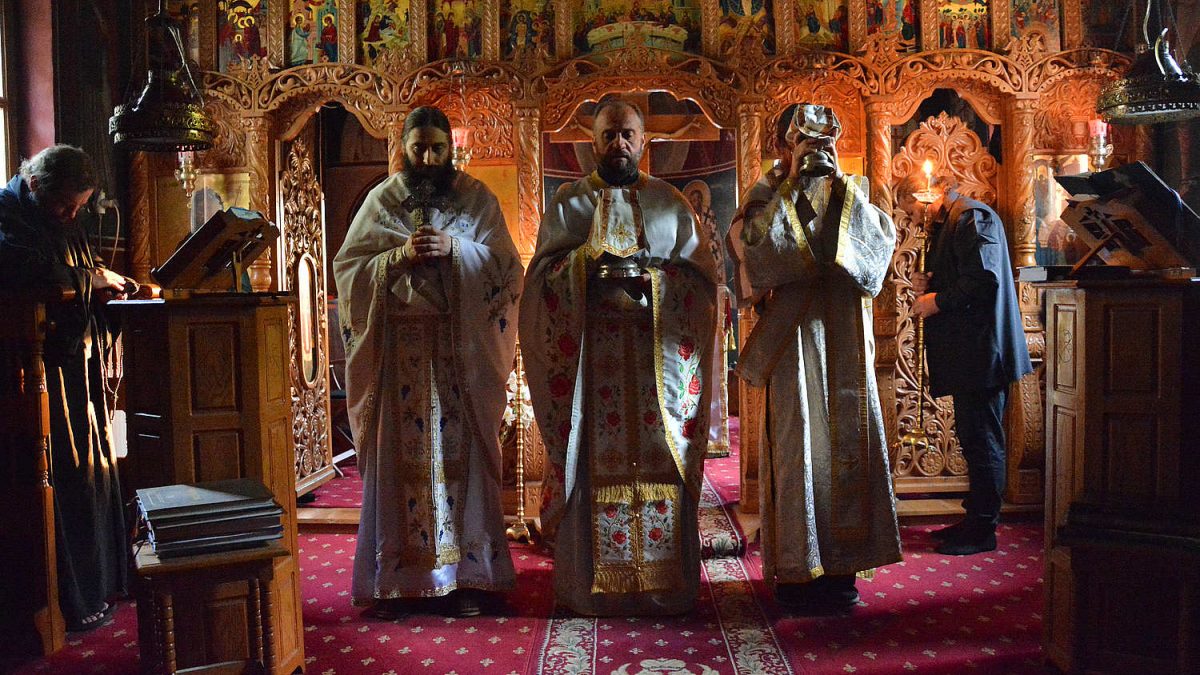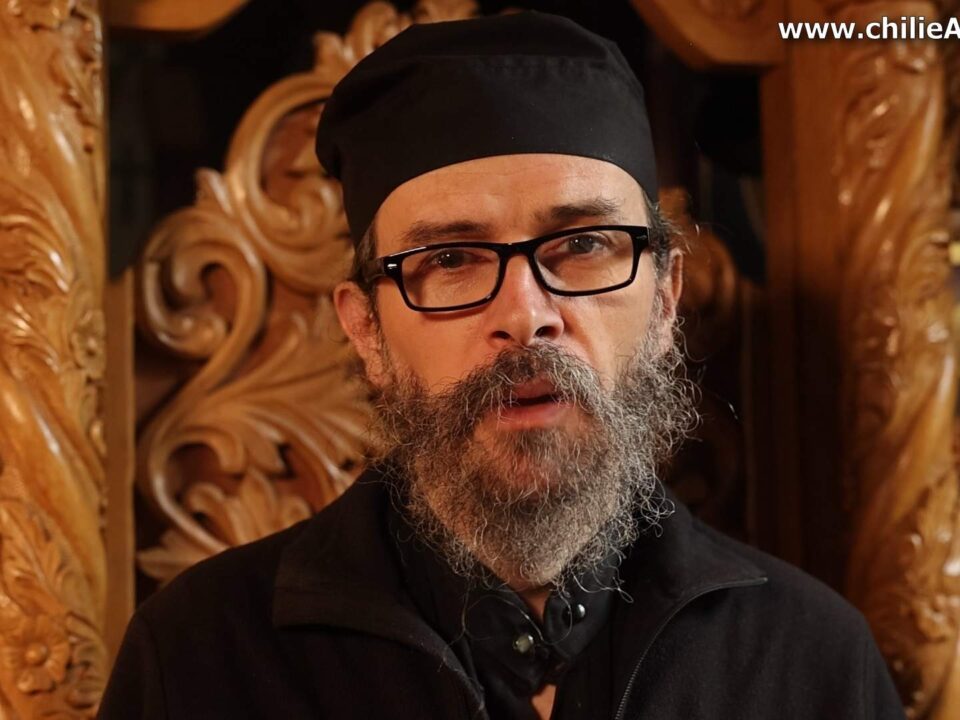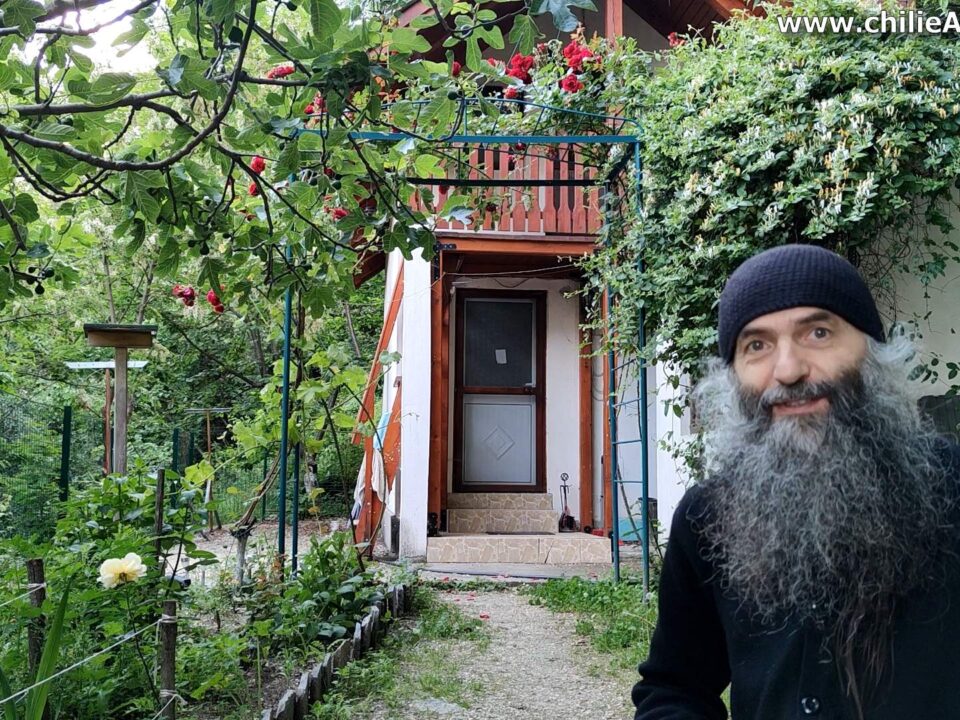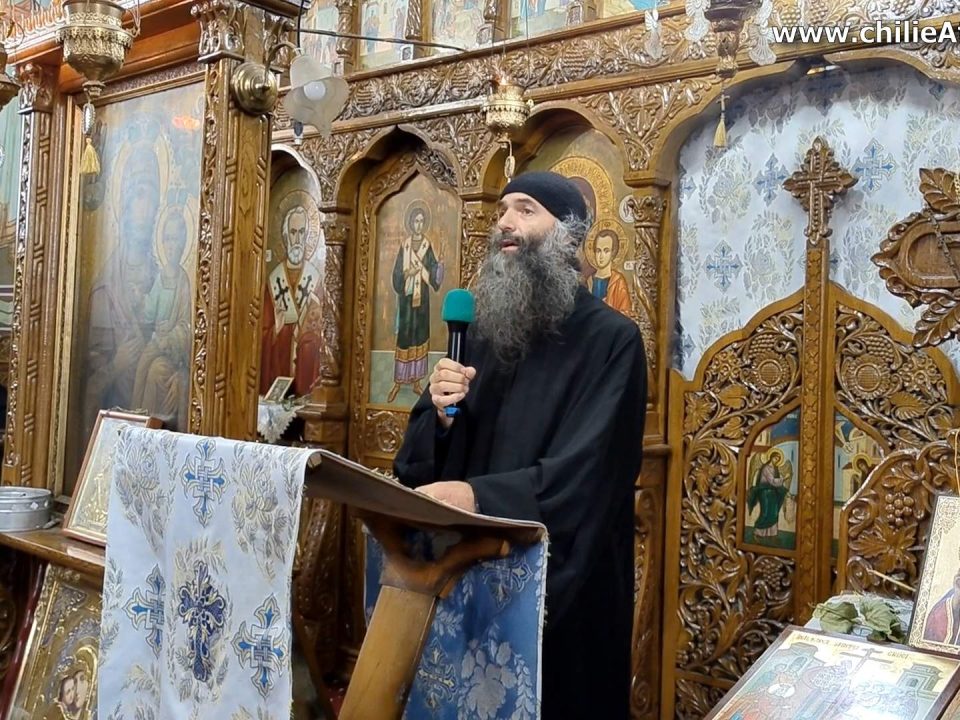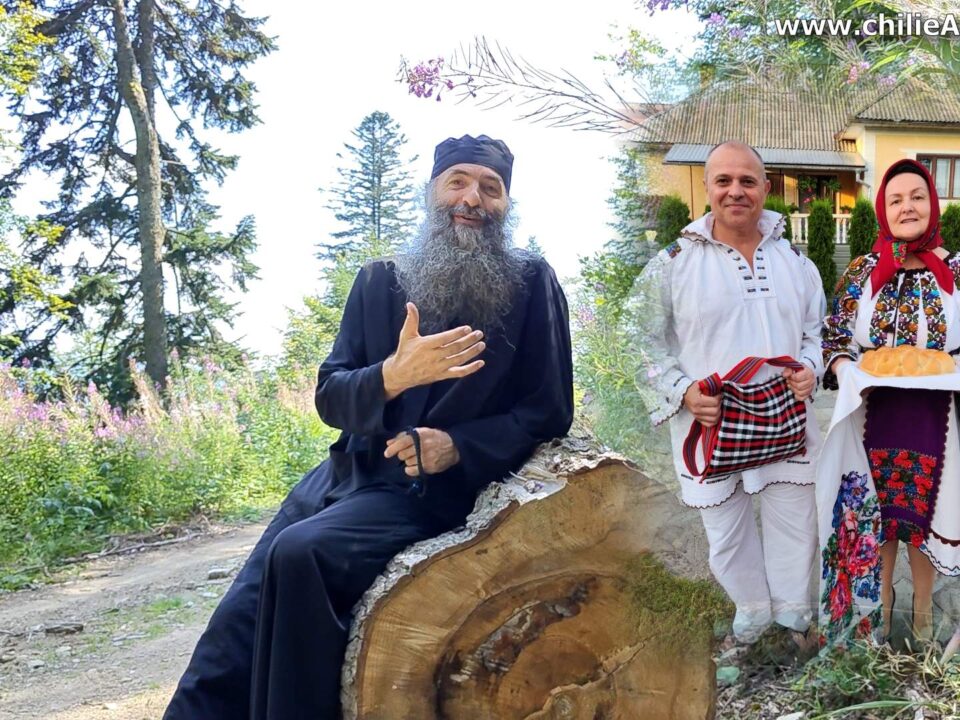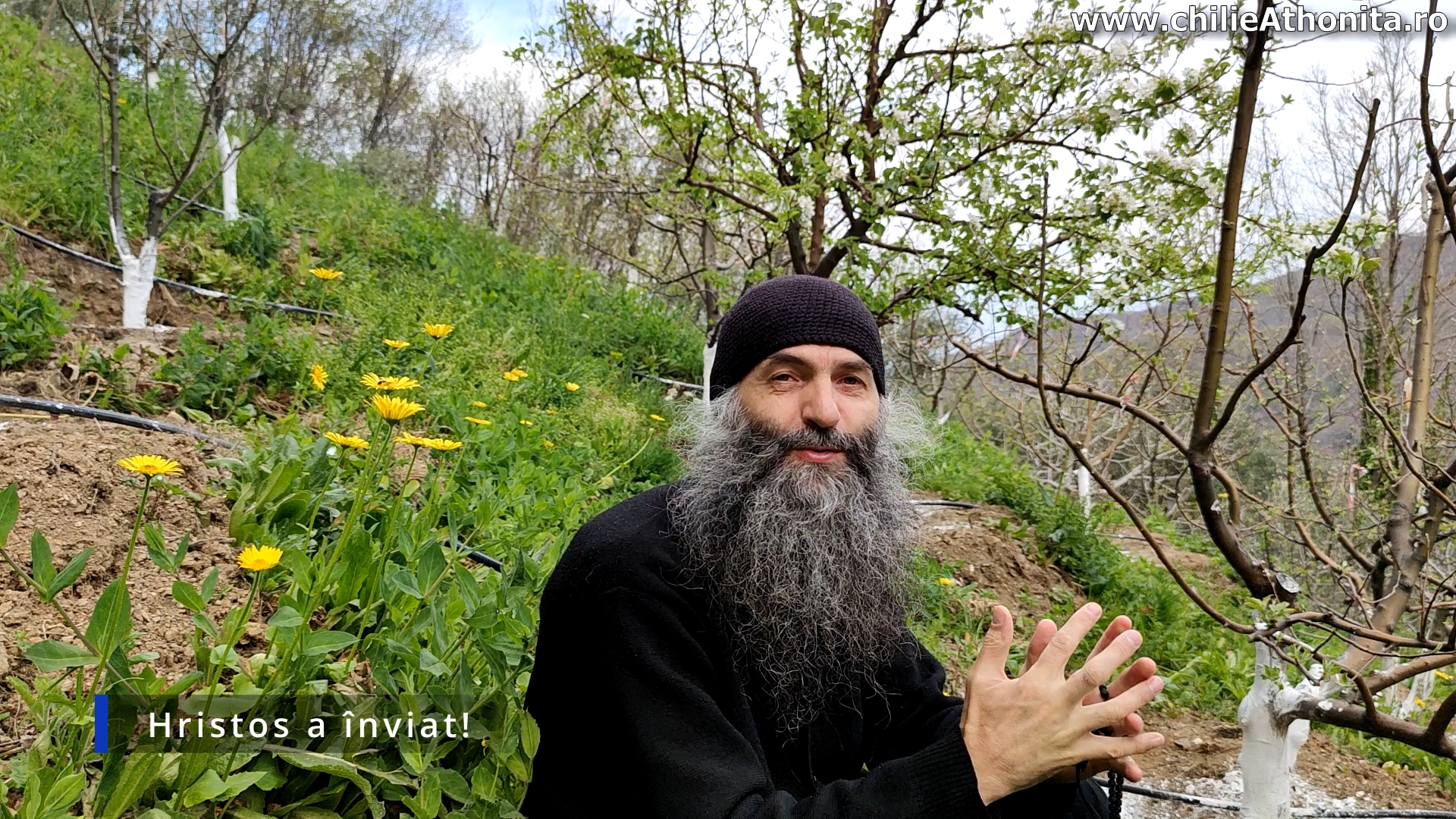
From Holy Thursday to Resurrection – Father Pimen
12 April 2023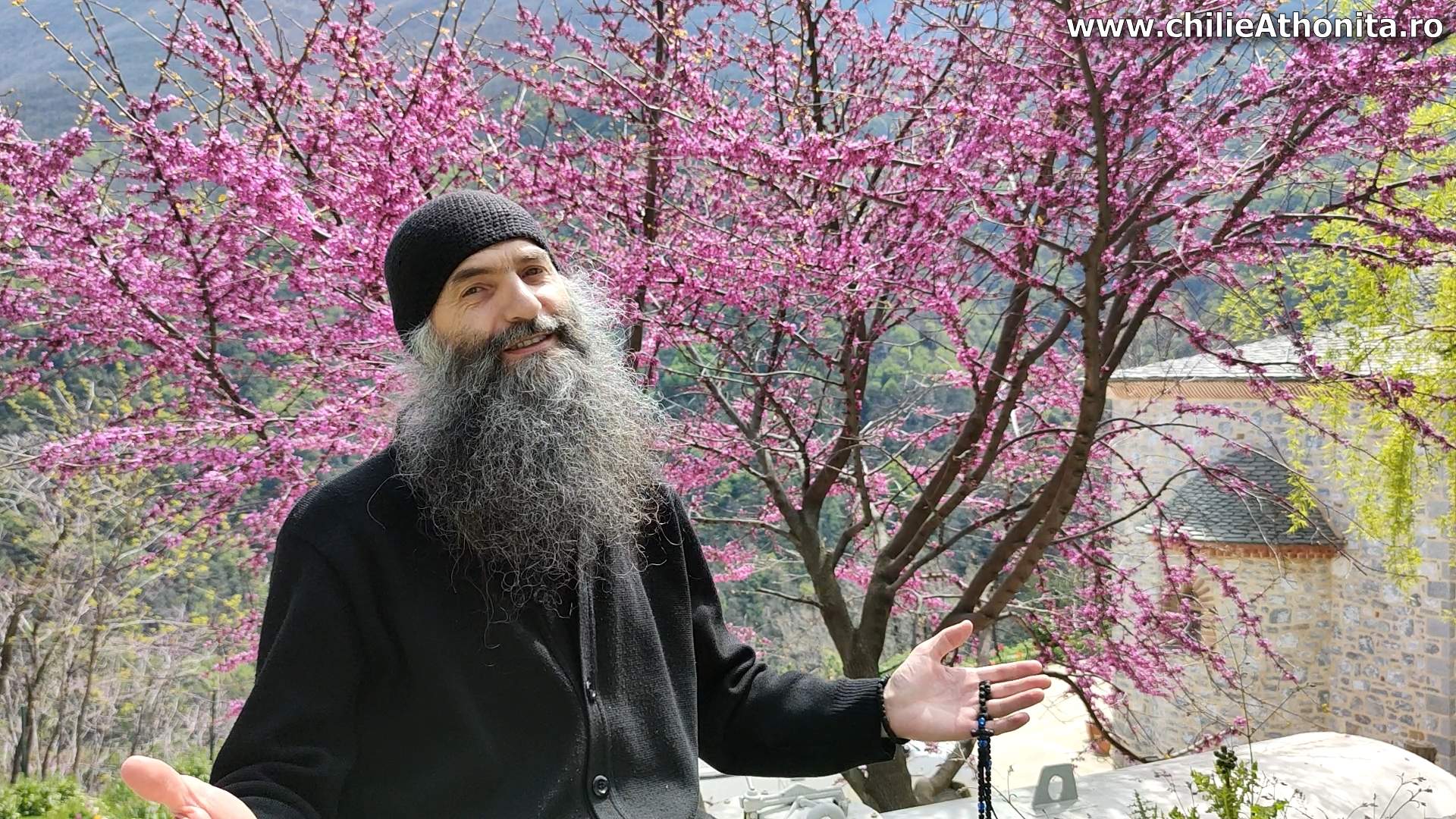
The Life-Giving Spring and Bright Week – Father Pimen
21 April 2023How do we pray? When should we pray? What are the benefits of prayer? Listen to a fine production that Lucian Apopei, director of communications of the Archdiocese of Iasi, made together with TeleM in collaboration with the Metropolis of Moldova and Bucovina to find answers to these questions.
Enjoy!
Lucian Apopei: Welcome to a new edition of the show for your heart, “Windows to the Soul.” Today we are talking about prayer, about talking to God and where can we speak about this better, more appropriately about prayer, than here on Holy Mount Athos? We are at the cell of the “Entrance of the Theotokos into the Temple,” at the Romanian Lacu Skete and we are together with Father Abbot Pimen Vlad. God help us, Father!
Fr. Pimen: God help us!
Lucian Apopei: Thank you for welcoming us, for welcoming us back alongside Your Reverence!
Fr. Pimen: As the Mother of God allows, She also allows us [to be here].
Lucian Apopei: Forgive us for coming to speak about prayer, when… perhaps the fathers here know best that speaking, in fact, is done towards God. It is that correct direct formula of speaking to God, more so than between people, but there is also this side of socialization between people.
Fr. Pimen: What happens is… if we look through this prism, the human one, as it was in ancient times when there was an emperor, something… So what was the greatest honor? To be able to talk to the emperor. Many would say: “I only saw the emperor and that was a great honor.” But to go and talk to the emperor, to have the emperor pay attention to you… That is what it means to talk to God, to talk to the King of Kings. We often start talking to God, either in prayer at home or at church, and I talk to God for two minutes and then: “Hey, John, what did you say you did before?” “Hey Ileana, what do you say?”
And God is left stranded, so to speak, and looks at us, and we… after half an hour [say], “Oh, Lord, you know, hear my prayer!” So that’s what we people do, how weak we are, many times you finish an akathist and if someone asks “What did you read?” “Ah… Well, the beginning and the end, something like that.” We do not understand what we ourselves have spoken to God, and then we want God to hear us. So prayer means total dedication, to go from the heart to reach the heart. So prayer… that’s why the Holy Apostle Paul also said to pray without ceasing. That is, our whole life should be transformed into a prayer. And in what way? Here I remember something. Father Ioanichie Bălan would say…
Here we are going back to prayer in the world, because we say that here [in the monastery] we have all the conditions, the services at the church constantly – we all participate in them, and even the Christians who come – also everything here urges you on: you go out a little, you do a little work, you are in quietude, you contemplate God, you glorify God and you thank God, but in the world when you get hit with everything…
And I go back to what Father Ioanichie Bălan once said; He used to tell us, even at the monastic school once, he told us this back in ’92, or some time around that, when I was at Sihăstria. And he said, “A woman came…” and, before, there was no bus to Sihastria Monastery, there was [only] one to Gura Secului. From there, there was a 7 km walk to the Sihăstria Monastery and the woman had a bag, with almost 10 kg of beans, brought from what she had at home, for the Monastery. And she came to Sihastria, it was around Good Friday. And she says, “Father, can I confess?” “Yes, grandmother! Come here!” She said, “You know, father, I have 7 children at home. Well, now you should know that I fasted, since last Sunday I haven’t eaten anything.” So she was already 5 days into her fast. And she says: “If I can, I will fast until the Resurrection to be able to receive Holy Communion.” So a week. A woman who, with 7 children, had come on foot 7 km, also had a bag of beans on her back, and she said, “Father, I want to tell you something… I try, there among the children, making the food, to say ‘Lord, Jesus Christ have mercy on me,’ ‘God, help me,’ ‘Mother of God help me,’ I say how I can and, once I kept saying to God, ‘Lord, help me, Lord help me…’ And I was stirring in the pot of borscht, there was the heat, I was sweating, and suddenly I felt like a fire from heaven in my mind, and it went into my heart and tears started to flow, they were flowing in borscht, I was stirring and it lasted a few hours.” And she said, “Father, what could this be?” She said, “All my worries disappeared, my tears flowed and I had joy inside.”
And Father Ioanichie told us, “Well see, the babushka in the world with 7 children, stirring in the pot and she got to the Prayer of the Heart, and we, in the monastery, who force ourselves don’t get to this.” So it can also be done in the world, where there is simplicity, where there is innocence. So if the person dedicates oneself wholeheartedly to God and says “God, help me,” “Mother of God, help me” and sees one’s weakness, “Lord you see that I am with the children, I don’t pray properly, Lord, I don’t have time to do I don’t know how many prostrations, to spend hours praying, God have mercy on me,” but those [prayers] go like arrows to God.
And it was also at Sihăstria, I remember something that Fr. Dimitrie Bejan recounted. He had been convicted during the communist regime, and after 6 years in Oranki, in Siberia, after that for years through Baragan, he was given mandatory residence in Harlău, and sometimes he ran away to Sihăstria at night because he confessed to Father Cleopas. And he would somehow leave in the afternoon, and he would arrive at night, he would confess, and first thing in the morning he would leave from there. And he says, “I went to church, and after Matins they all left and I stood behind the door, in the dark, in a pew; I would sit there and pray… and there were two elders of Sihăstria, you could see that they looked similar – two brothers – and they stood in front of the Icon of the Mother of God, they raised their hands, they put their heads on the ground and as they prayed a halo began to play around their heads, lights, everything, around their heads, and the elders prayed for about an hour and they left and I wondered at what prayer they had.
Well, the night passed and in the morning he was waiting to take the bus, it was before I don’t know what time, before 9, or something, the bus was leaving from Sihăstria, and he saw a simple woman, a peasant woman coming there, there was no one in the Church, it was before the service began and in the altar there was Fr. Cleopas, he was doing the Proskomedia for the Liturgy, but the service had not yet begun, Fr. Cleopas had come to commemorate more names an hour before. [Fr. Dimitrie] was in a corner sitting, and the old woman came, she worshipped the icons and then she stood in front of the Church, in front of the Holy Altar, she raised her hands and began to tell God about her troubles: God, you know that child, so-and-so… whatever she said. And he said that at that moment he saw the same halo around her as around those elders and he realized that the old woman was at the same level as the elders.
And he said that Fr. Cleopas, as he was celebrating the Proskomedia, felt the Grace, and Fr. Dimitrie saw him move the altar door curtain a little, he saw the old woman in that state and after that sobbing could be heard from inside the Altar. Fr. Cleopas was crying because of what he had seen in that old woman. Afterwards he [Fr. Dimitrie] said, “I met the old woman at the bus, because she was also leaving, and I asked her… she was a simple woman, from a village, with children, with with her troubles…” and he said: “What [spiritual] measure she was at… at the measure of those fathers who had been in the monastery for a lifetime…”
Lucian Apopei – So we can’t use as an excuse the fact that we can’t [pray] in the morning because we go to work, that we can’t at noon because we’re in the middle work, that we can’t in the evening because, as Constantin Ciomâzgă said, “I start an akathist to the Mother of God and the mother of sleep grabs me, so….
Fr. Pimen: Yes… these are not justifications. You see that this old woman did not pray the prayers that those elders prayed, maybe for hours, but the [spiritual] measure was the same.
Lucian Apopei: These are cleverly formulated excuses.
Fr. Pimen: Yes. So the measure was the same. Why? One “Lord have mercy” of hers may have counted as much as a quarter of an hour of prayer of the others, it was that simple, direct prayer to God, which was going [to Him], in humility.
So anyone in the world can pray, but as I said, to leave with prayer, leave the home with prayer, thanking God wherever he goes asks for God’s help, in the evening when they return, in the same way, all the time with prayer.
Lucian Apopei: Father, maybe we don’t know how to pray… I don’t know. St. Sophrony Sakharov said very beautifully: “Teach me, Lord, how to pray.” But can we use that “I don’t really know prayers….” Can we use this as an excuse?
Fr. Pimen: Do you know what happens? If we go with “We don’t know how to pray” and think we can get away with it… So the prayer you read is good also where you read a prayer in the morning, an evening prayer, an akathist, a paraklesis, you try to focus as best you can….But all the time before starting, as father once said, “You need to heat up the oil, like for the car, when you start the engine, you don’t start it all up at once, you let it warm up first.” He said, “What does this mean? Do a few prostrations before starting the prayer, 3 prostrations, 5 prostrations, 12 prostrations, as many as you can, so that then you can oxygenate the brain as well.” What happens? As you are drowsy, sleepy, if you do a few prostrations, you begin to breathe with all your heart, as they say, the lungs are fed, the brain is fed, the mind is cleared and focuses a little, because while you do 10 prostrations you say “Lord Jesus Christ have mercy on me,” or “Glory to You Lord,” so this focuses the mind and after that you start reading a prayer and then, what I want to get to, he says, “You also need your own prayer, in which you sit on your knees, or even standing, as you can, in front of the icon of the Mother of God and you talk directly to her, because then your mind doesn’t run away when you talk. You talk to a person, you talk to the Mother of God, you tell her all your problems, your joys, your sorrows, this means prayer from the heart to heart… So we must have this every day a little bit, our own prayer.”
Lucian Apopei: Why is it important to pray, can’t we be autonomous? I don’t know… by our own strength.
Fr. Pimen: And then what do we do? We come to what the yogis say, to what everybody says, that, “You know, we have undiscovered powers, and so on….” What are we? You see, we’re nothing. Can we do something?
Let’s see you make an ant, make something… You see that little ant, make it if you’re that great, make anything. You have a disease… Solve your problems. I mean, we see how weak we are… See, you broke a leg, solve your problem, put it back, hammer it back, hammer two nails [into it], solve it. You see that you can’t. We are very weak. You see, the heart stops, it’s over. You hit something, you hit yourself in the eye, you can’t see anymore. So there are some simple things through which we see how weak we are. We are in constant need of help, so I spoke of this bodily part, but the soul, that state when you are fallen… how much strength you get when you cry out to God: “Lord!” And when you think, “God helps me, so He exists!” No matter where you are. Sometimes, of these worldly tools, you say “I don’t have the axe with me to defend myself, I don’t have that…,” but you can have God anywhere. If you are 100 m underground, in the mine, you are locked in the deepest prison, wherever you are… to God you can shout anywhere and He hears you.
Lucian Apopei: And we come to a natural question, which stems from the content of the show. What is the power of prayer?
Fr. Pimen: The power of prayer…. so what happens is that depends on our humility. Prayer becomes stronger the more humble we are. Because it says, “God resists the proud, But gives grace to the humble.” The more you humble yourself, the more the Grace of God comes. And what does the Grace of God do? It teaches you to pray, it gives you strength, it lifts you up, as they say, out of the mud, it makes you strong and makes you a good person, by the Grace of God, a person of mercy, a person who has love, because what is love? God is love, it says love never fails, love is above all. And then the person who has the grace of God has love. If one has love, one has everything.
Lucian Apopei: Is there also prayer in silence, in secret?
P. Pimen: Of course! It says that only then it goes directly to God. We have Moses, when the people had made mistakes, he was in the wilderness, Moses looked at them and was silent, and the voice of God came: Why do you cry out to me Moses?” He was silent… “You cry out to me,” so in the depths of his heart he was crying out to God, and that was heard as a cry to God, because when you cry out with your voice, those around you hear you, but when you cry out from your heart, with your pain, or a mother who sees that the child is dying and in the depths of her heart she cries out “Lord”… well, it goes to God directly.
So… Now we’re talking about the prayer of the heart, well, that is not shouted. The prayer of the heart is in the mystery of the heart, in which the heart speaks directly to God and God listens to it.
Lucian Apopei: What should we pray for, Father?
Fr. Pimen: So normally, as Christians, this is what we have to ask for: “Lord, may Your will be done in everything!” and then we can say the requests… God, you know, I would also like a car – speaking of the worldly – if it is Your Will, Lord, give it to me, if not, don’t give it to me. Lord, I want a house too, if it’s Your Will, give it to me, if not, don’t give it to me. Lord, look, we can’t have children, and we want them very much, Lord, if it’s Your Will, give us children, because we don’t know what the situation is, let it always be according to God’s Will. And then, God sees that we leave ourselves to His Will, and He knows better what is useful to us. Because many times we cry out and scream at God that God doesn’t hear and to give us [what we ask for], and in the end, God gets tired, so to speak, and says, “Here, if you want it, take it,” and then when you see that it has hurt you, you say, “Lord, if you knew that it would hurt me, why did you give it to me?” but you forgot that you cried out to God for 2-3 years for that thing. That is why we should always ask God, but let us end the prayer with “If it is Your Will and if it is useful to me.”
Lucian Apopei: What is the connection between prayer, deed and fasting? Because I’m thinking they are linked with each other…
Fr. Pimen: So what happens is, prayer… Let’s say for a man who ate a pig, drank two bottles of wine, what prayer can he have in those moments when he is gorged and yawns and falls asleep and is dizzy with wine… But for a man who drank a glass of water and was satisfied with that, let’s say, for that day, so the body is threadlike, it’s thin, that man is not in the mood for dirty thoughts anymore, and so on, so the body is under control, it’s quiet, as they say. And then, that man prays differently. So the body is a little constrained. He prays differently and then the man no longer has that state of looking down on others, that is, he is humble, when he is fasting, he does not rise above the other, he does not look down on them, but a man who eats well, sleeps well and… We don’t say that there is no need for this, but taking these things to the extreme, and he has riches, and he looks down on others, he ends up doing deeds that are not good. We’re not saying that wealth is bad, because you can have wealth and do good things, so all of this… Therefore, prayer, with fasting and good deeds, these go to God, if all three are intertwined. So we see we pray with a little fasting and we also do good according to our strength and then all three are intertwined and are done properly.
Lucian Apopei: What are the obstacles? Against prayer…
Fr. Pimen: Do you know what the devil does? He has a habit there… It is said that at the meeting of the demons they each came when the Devil asked them how they deceive people: “Well, I tell him that there is no God.” Another, “I tell him not to go to church,” another, “I do something else…” and one comes and says: “I tell them there’s both heaven and hell, there’s God’s punishment, everything is true, but you have time. Don’t do it today, [but] tomorrow…,” postponement. Every day saying, “[I’ll do it] tomorrow.” The angel comes and says, “Come on, start praying a little to God”… and, the devil comes, “You are tired now, leave it and pray tomorrow.”
“Listen, go and do a good deed for that poor widow, for look, her gate has fallen.” The devil comes, “Leave it, you’ll do it tomorrow.” “Get up and go to the Liturgy.” “You are tired now, leave it for next Sunday.” There is always a tomorrow, and this is the devil’s greatest struggle: postponement. To delay. We know there’s heaven, we know there’s hell, somehow we clog our conscience with certain reasons. “Well, now I’m tired, I’ll do it tomorrow, I said I will do it, I didn’t say I’m not doing it. But I will do it tomorrow.” And it will be “tomorrow” until we reach old age.
And time passes, which is the most valuable to man, and we don’t know, we reach a day when there will be no tomorrow, because we leave. And then God will ask us, “But why…?” “Well, God, I kept saying ‘tomorrow.'” “What tomorrow? I’ve given you 70 years.” So postponement is the devil’s greatest deception, so that we don’t do [what we should], to postpone permanently. No! Do it today! The neighbor comes, he asks you [for help], [you say,] “Wife, I am going for an hour to help him. I’ll work for us tomorrow!”
Something else, however tired you may be, say, “There’s Liturgy, the bells rang, I go to the Liturgy. If I am tired next Sunday, maybe I’ll stay behind then. I will postpone the other but today I will do it.” So let’s not delay.
Lucian Apopei: Father, you have been here on Holy Mount Athos for many years, I am convinced that you have seen and felt many of the fruits of prayer, many miracles that have arisen as a result of this initiative. Can you give us some examples of the fruitfulness of prayer? I once heard you speak of a hermit who had a special devotion to the Mother of God, with that lily.
Fr. Pimen: Yes, so there is a lot to go into, think about it, I came almost 30 years ago to Holy Mount Athos, with only the clothes on me, with nothing else. And as it was difficult then with the visa, in Jerusalem I slept for 2-3 weeks in the bushes, as they say, I didn’t have any money, that is, for me it is always a miracle how the Mother of God brought me here. So even starting from Sihăstria [Monastery] 2 weeks before, Fr. Cleopas shouted from top of a hill – he was laughing and saying – “Be careful not to run to Athos,” but somehow it sounded like, “I know you will run to Athos.” After 2 weeks I could only see Athos in front of my eyes, and at that time I didn’t even think about it. I arrived in Jerusalem with nothing, without money, I slept in the bushes, I ate grapes from the trees. The Mother of God brought me, she gave me a visa too and I arrived in Athos.
I mean, plus coming to Athos, we came to nothing, we came to this Skete which was a ruin, all the houses demolished, we gathered at a house where it was raining in 300 places. In the cell where I was staying I had a 2-meter-long board above the bed, from where there was another board that led to the stove and there was a basin that collected water from above the bed so that I could sleep in bed. It was raining everywhere. There was nothing here.
Well and I look back now, at this, just think, after all this, what a miracle was worked in this Skete, which was a ruin, there was nothing. The few of us gathered at that little house and from there we kept scattering and rebuilding. There are 17 houses as you see here, with churches put in their place and 60 monks, all of this out of nothing, and [being here] as foreigners.
And this is what I used to say many times, the greatest miracle for me, which I never forget, and somehow, I look at it like the miracle of the Mother of God for me… Athos is unique in the world, there are so many beautiful places, holy places, but Athos has something. Only Athos was chosen by the Mother of God as Her garden, in which she did not allow women to enter….that is, there is a 2000 year observance. And here, there are a few monks from all over this world, from this world that has 7 billion [people], as many as it has. Think that there are 2500 monks, that is, what percentage of that, how little of this world. And this is what I said, that regardless, out of these 2500 monks, the Mother of God took me, from a country at the end of the world, so to speak, to come here, and after 30 years, apart from helping me day by day… You see this is the second cell and church that I built, first I built St. Artemios, below, then this – from scratch, from nothing. And after so many years, after offering me so many conditions, so many good things, so many situations, the Mother of God still endures me in her garden. I mean, what greater miracle is there?
The others, as there were interventions, what you see, this construction here… Just think, in 2015, I was 1000 euros in debt, I didn’t have any money, and I started all this work here, there were 2 Greeks, one of whom is now dead, one is still alive, about an hour away, and I knew them, and at one point they heard that Pimen took the cell at Nicola, this area was called “at Nicolae’s,” where there was nothing, there was a pile of boulders here, and he said: “Well, either he’s crazy, or he has a bag of money.” Like, “What does this man need?” I had that cell, we were gathered there, there was Liturgy every day, we were 10 fathers, and “What does that man need?” He says, “Either he’s crazy, or he has nothing to do with his money.”
I didn’t have any money, and I was also 1000 euros in debt, when I started here. And think about it, everything you see here, the church, the house, the guest house was built from 2015, from scratch, without a single penny. That is, when I saw these things, day after day, that the Mother of God would come, and when there were debts, she came and paid them for me, she sent a man I didn’t know, he said, “Father, take this money, the Mother of God told me to give you this money to cover your house.” To have someone come and tell you this… I mean, a lot of things like that, which were one after the other.
That is, all my life, as it were, it was a miracle of the Mother of God, in which I always marveled at Her goodness. I mean, how can you not love the Mother of God? When you see that every day She makes her presence felt through something specific. What more could I say? Because there are many others…I won’t go into it anymore…
That’s why, for me, the Mother of God is everything. Someone in [Romania] actually asked me, “Father, I hear monks talking about God, about Jesus, about so-and-so, but I hear you talking all day long only about the Mother of God. What’s the difference, why are you talking?” I said, “Because she is my direct Mistress. I live in the house of the Mother of God, besides the cell, in the garden of the Mother of God, and every prayer I address to Her, She passes it on. She is my direct Mistress, of whom shall I speak? She is my direct Mistress, so I talk about her wherever I go, because I know that she takes care of me, she is my Mother, and then She goes further and carries these things on.”
Lucian Apopei: May She keep you under her protection, father!
Fr. Pimen: All of us!
Lucian Apopei: Thank you very much! The format of our show somehow constrains us…
Fr. Pimen: May the Mother of God help us! May She help us and let’s never forget about her! As St. Paisios said, “Hold on [to her] with both hands, like a child by his mother’s skirt,” and then she never leaves us.
Lucian Apopei: May the Good Lord help us!
Fr. Pimen: God help us! May the Mother of God help us!
Lucian Apopei: Folks, this was today’s edition, we hope to have shared with you at least a drop of the prayer that is done here daily, on Holy Mount Athos, which I am convinced helps each of us, whether we manage to get here or we do not and are at home, where, as the father said, we can make a little Athos, in our prayer corner. Until next time let’s hear only good [news]. May God help us!
Pomelnice online și donații
Doamne ajută!
Dacă aveți un card și doriți să trimiteți pomelnice online și donații folosind cardul dumneavoastră, sau/și să susțineți activitatea noastră filantropică, inclusiv acest site, vă rugăm să introduceți datele necesare mai jos pentru a face o mică donație. Forma este sigură – procesatorul de carduri este Stripe – leader mondial în acest domeniu. Nu colectăm datele dvs. personale.
Dacă nu aveți card sau nu doriți să-l folosiți, accesați Pagina de donații și Pomelnice online .
Ne rugăm pentru cei dragi ai dumneavoastră! (vă rugăm nu introduceți detalii neesențiale precum dorințe, grade de rudenie, introduceri etc. Treceți DOAR numele!)
Mai ales pentru pomelnicele recurente, vă rugăm să păstrați pomelnicele sub 20 de nume. Dacă puneți un membru al familiei, noi adăugăm „și familiile lor”.
Dumnezeu să vă răsplătească dragostea!


